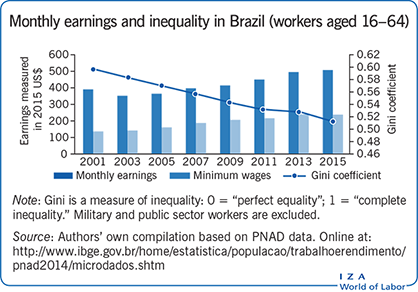Elevator pitch
From 2001 to 2015, Brazil experienced a profound reduction in income inequality. The commodities boom and some institutional changes in the early 2000s kick-started the Brazilian labor market, increasing the quantity of formal jobs and earnings, especially for the poorest workers. Significant increases in average schooling and the real minimum wage helped reduce ethnic, gender, and regional earnings gaps, though all remain rather high. However, since 2014 a major fiscal crisis has negatively affected GDP and the labor market, seriously threatening these achievements.

Key findings
Pros
Unemployment fell and more formal jobs were created, even with a 92% increase in the real minimum wage.
Average schooling years for private sector workers increased, whereas returns to schooling fell in the same period, con-tributing to declining inequality.
Gender and ethnic earnings gaps decreased substantially.
Employment protected by formal contracts increased both in quantity and in share of total employment.
Cons
Since 2015, the unemployment rate has jumped from 7.5% to 14%.
While real increases in the minimum wage helped reduce inequality during the boom period of the 2000s, since the start of the crisis period in 2014, they have contributed to increasing inequality.
Gender and ethnic earnings gaps remain high, at 41% and 15%, respectively.
In 2015, only 46% of employees in the private sector were protected by formal contracts.